India’s ‘bulldozer justice’: eyewitness accounts of ‘ethnic cleansing’ obliterating families
After deadly religious riots, an Indian state government ordered the destruction of hundreds of homes and businesses in a Muslim-majority area where the violence began. Namita Singh travels to the northern state of Haryana to meet those who say they did nothing wrong yet saw their livelihoods crushed

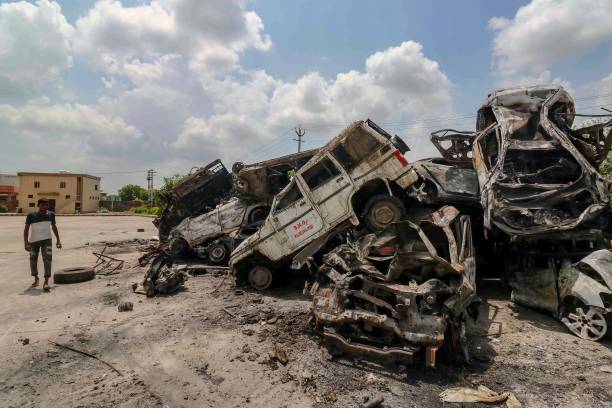
When religious riots broke out in his town last month, Muslim father-of-three Anees Khan did something unexpected: he opened up his home to offer shelter to a group of Hindu men fleeing for their lives.
Yet far from being rewarded for this act of compassion, Khan says he was instead punished. When local authorities in Nuh, Haryana, declared a demolition drive targeting the area where the violence started, the same home that had been a refuge during the riots was bulldozed.
The clashes on 31 July began when a religious procession organised by a hardline Hindu organisation passed through a neighbourhood in Nuh, where many Muslims live. Fighting broke out and vehicles, shops and mosques were set on fire as the violence spread to the major city of Gurugram, which neighbours Delhi. By the end of the night, six people had been killed.
What followed was a response that mirrors the actions taken by state authorities across India where the ruling BJP is in power: rather than wait for police to arrest suspected rioters, and see prosecutions enter the quagmire of India’s notoriously slow judicial system, so-called “bulldozer justice” was enacted, with demolition teams sent into the Muslim-majority neighbourhood where fighting began.
Standing amid the rubble of his ruined home, Khan tells The Independent the recently-built structure was not “encroaching” on public land, as the authorities alleged, and that all his papers were in order. Prior to hearing that the bulldozers were on his doorstep, he says, he “did not receive any notice from the government”.
Tensions had been building throughout the day of the procession in Nuh, amid rumours that those attending would include Monu Manesar, a wanted right-wing Hindu vigilante accused of killing two Muslims on the pretense of protecting cows.
Recalling the night of the riots, Khan says: “I was inside my house. In fact, we sheltered three men to protect them from violence. They were escaping for their lives when they asked us to take them in.
“I do not know whether they were from any particular group, but they were Hindu men seeking refuge after the rioting started to take place during the procession they were participating in.
“We fed them, and after four or five hours I also dropped them off [safely] at a guest house.”
All that remains of Khan’s house is a roof, leaning on several wooden logs. The main pillars, the front and side walls are gone.
On 5 August, when his home was razed, Khan says he was away in the neighbouring state of Rajasthan. “The men we sheltered were the ones who informed me that it is being bulldozed. They informed [the police] also that I was not involved in any violence.
“I would have made peace with it had I done something wrong. [But] the government is bulldozing the houses of people who are saving lives. You tell me, what kind of justice is this?”
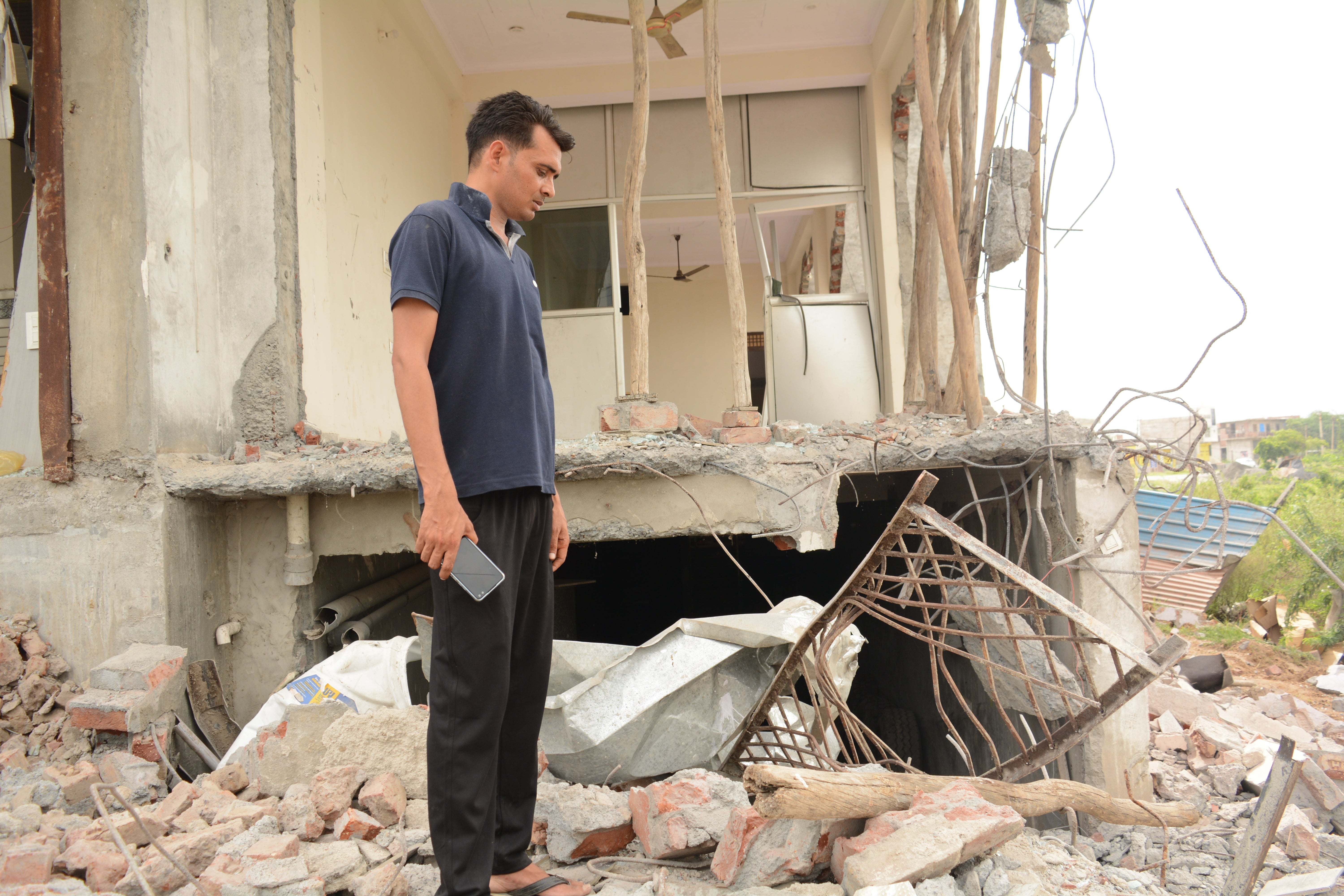
The concept of bulldozer justice was first popularised by the hardline Hindu monk-turned state leader Yogi Adityanath in Uttar Pradesh, whose use of the machines to enforce law and order – destroying property belonging to criminals and gangsters in the state – has earned him the nickname “Bulldozer Baba”. They have since become a symbol of Adityanath’s political might, and have even taken pride of place in his election speeches.
The model has spread to other BJP-ruled states, including Madhya Pradesh and Assam, as well as being deployed by the municipal authories in parts of Delhi, and is being hailed by party supporters as a sign of the authorities taking tough action on crime.
Critics say the approach has been used in the past to disproportionately target minority groups, and that such extrajudicial justice denies those involved the right to protest their innocence, as in Khan’s case. Boris Johnson’s decision to pose on top of a JCB during a prime ministerial visit to India in April last year was criticised as “tone-deaf” given this local context.
In Nuh, the sides of the road by the Delhi-Alwar highway that were once bustling with shops and kiosks have now been reduced to small mountains of debris. The local authority says 443 structures were flattened in total, of which 162 were considered permanent buildings.
A number of families have approached the courts after their homes were destroyed, saying that due process was not followed and that Muslim shopkeepers in particular were disproportionately targeted.
It has led the Punjab and Haryana High Court to raise the matter with the government, saying of the incident: “The issue also arises whether the buildings belonging to a particular community are being brought down under the guise of a law and order problem, and an exercise of ethnic cleansing is being conducted by the state.”
In a submission to the court, the district authority admitted that many more Muslims were affected by what it called an “anti-encroachment drive”.
“The number of persons affected from the demolition drive were 354, of which 71 were Hindus and 283 were Muslims,” said Nuh deputy commissioner Dhirendra Khadgata.
But Khadgata’s affidavit says this was simply the result of Nuh being a Muslim-majority area, adding: “The government, while removing encroachments/unauthorised constructions, never adopted [a] pick-and-choose policy... [based] on caste, creed or religion.”
While the government denies targeting minorities during the demolition drive, critics say it is unlikely to be a coincidence that Nuh was selected so soon after the riots there. Speaking shortly after the 31 July clashes, Haryana’s home minister made clear that the state would consider bulldozing the houses of those allegedly involved in the violence.
“Bulldozer is a part of the treatment,” Anil Vij said.
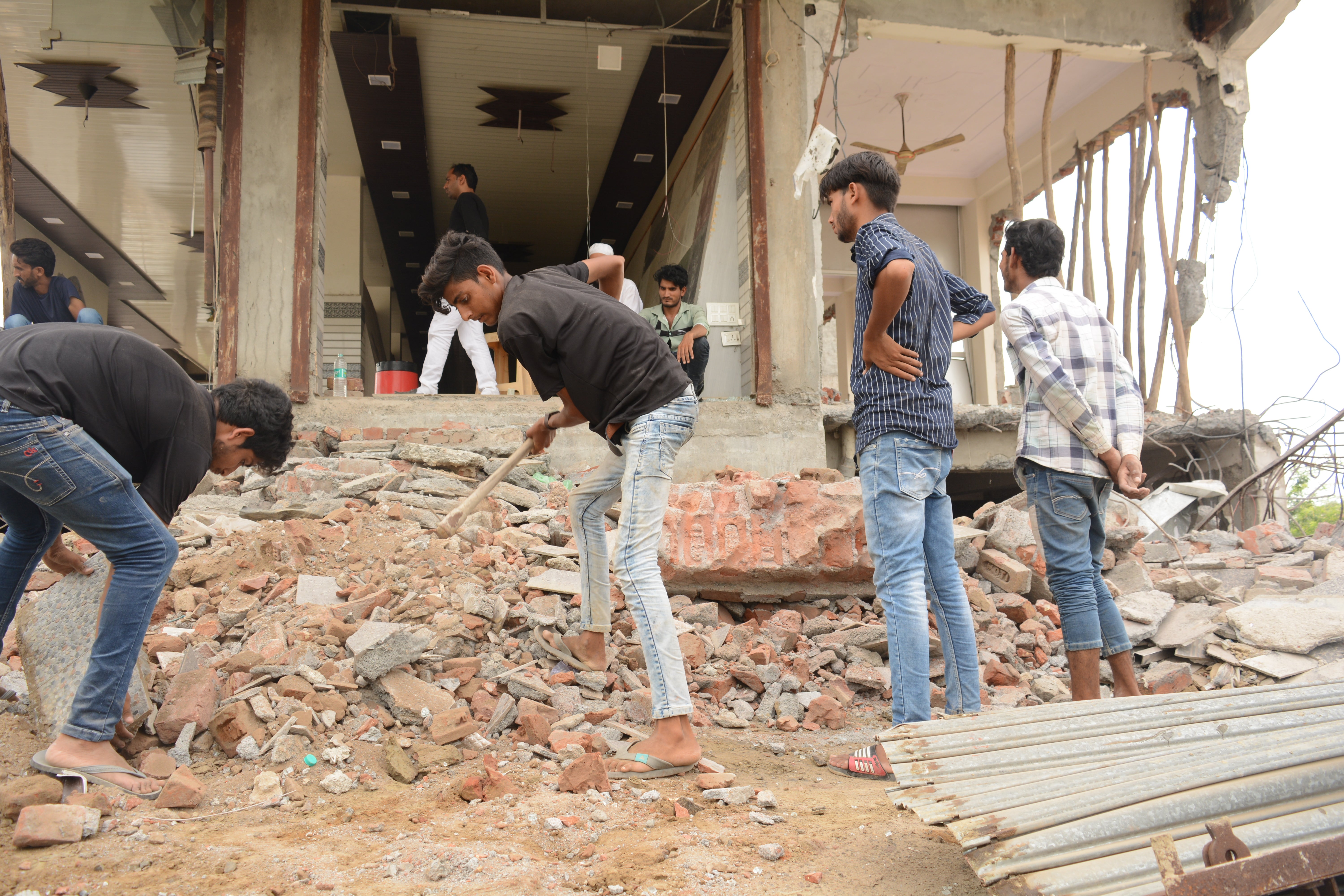
“The administration is destroying and bulldozing things to appease a certain sect of people. It is appeasement politics,” says Nawab Sheikh, whose family runs a group of 18 shops built on land that he owns in Nallar, about a mile from the centre of Nuh. All of them were bulldozed earlier this month.
“I did not receive a notice or anything,” he tells The Independent. “There were a lot of people from the administration. I showed them my papers. But they did not listen to me. Instead they detained me and kept me in the police station until the demolition drive was complete.
“If [my shop] is illegal, then everything from Nuh to here is illegal. They have not removed those shops. I have built the property on the land I own. And these properties are 10 years old. Why did they not bulldoze them then and why do you have to do it now?”
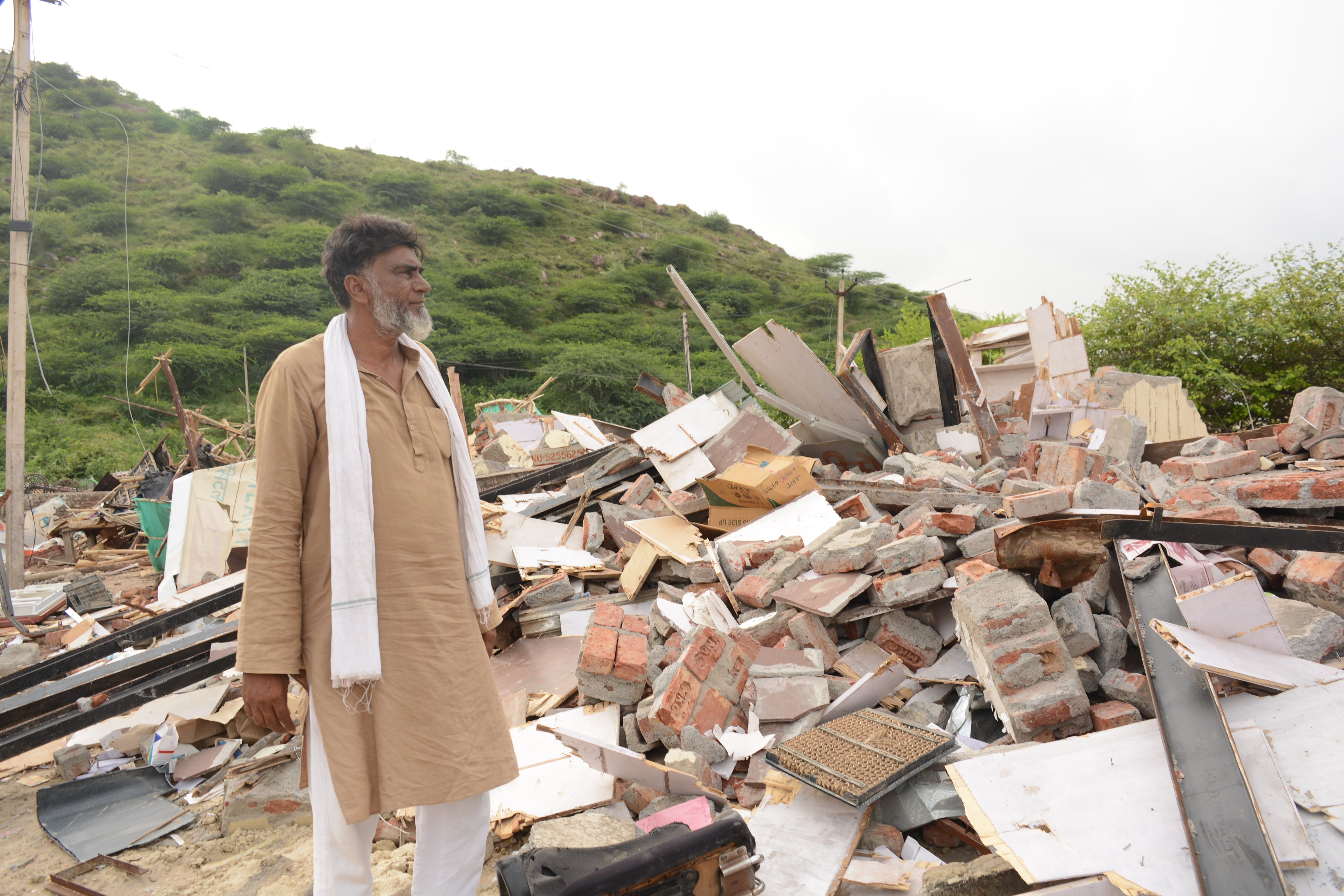
On being asked if he feels a particular community is being targeted, he says: “Of course! That’s what it is. The entire conflict happened because the government was lax.
“What is wrong is wrong. People who have committed a crime should be punished, we all want peace in the city. But what is this?” he adds, looking at the debris of his shops.
As well as the demolition drive, some 242 people have been arrested in the aftermath of the riots, and around 60 separate charge sheets have been filed by the police.
Mohammad Inam says four of his brothers were among those arrested, despite the fact that one of them was in Agra visiting the Taj Mahal at the time. He says the family have tourist photographs, as well as his time-stamped entry ticket for India’s most famous monument, to prove his whereabouts while the violence unfolded.
“But on 2 August, the police came and arrested him, saying he was involved in the stone pelting,” Inam says. Since then, Inam has been carrying copies of these documents around the city, searching for someone able to help in their case.
“We have submitted it to the superintendent of police, met him and the other officials twice. But everyone is giving us verbal assurances. Nothing is being done. I don’t know whom to go to for help. My sisters-in-law, my mother, their children, everyone is crying. I just hope we get justice.”
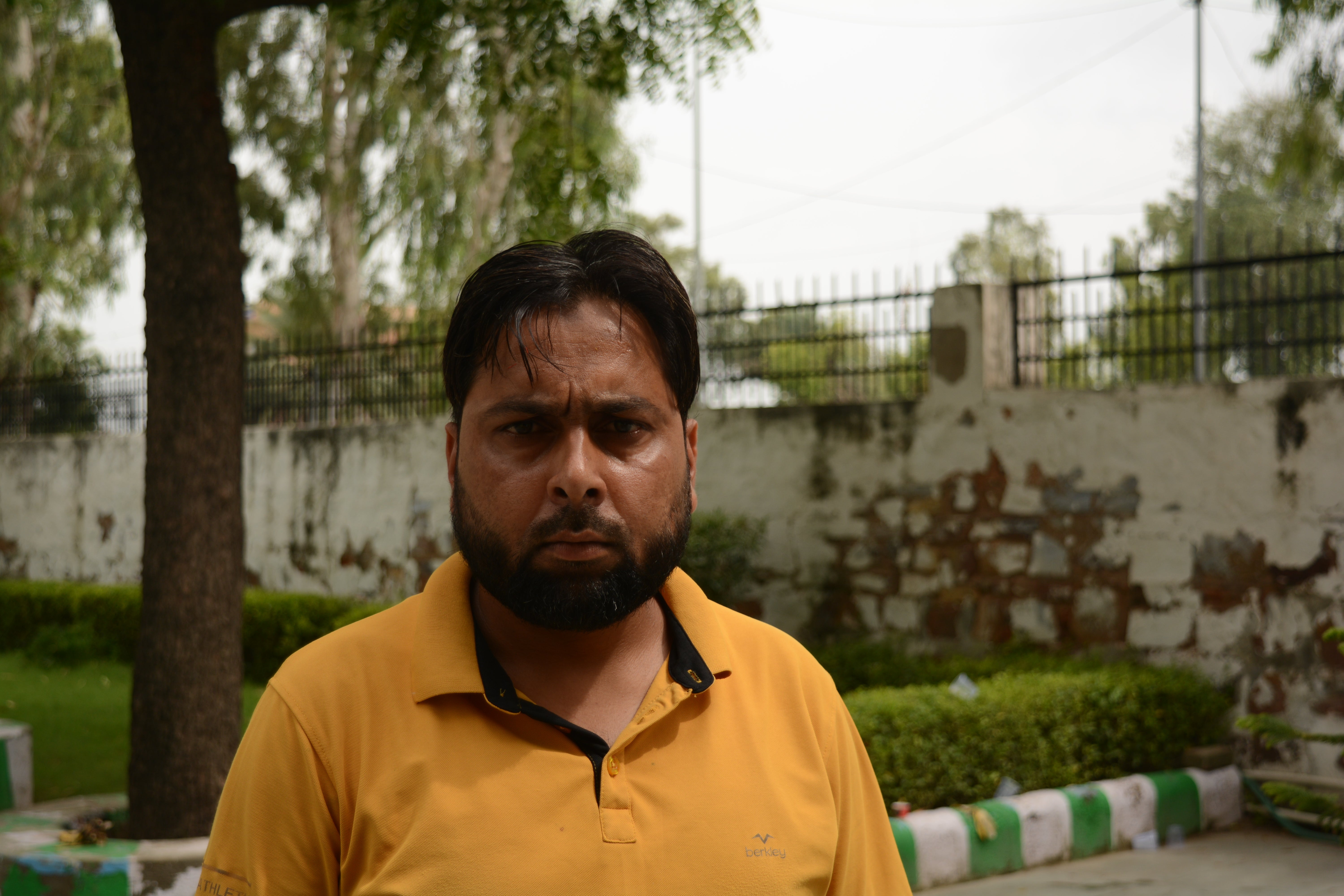
The Independent reached out to police superintendent Narendra Bijarniya for comment on the Inams’ case but he did not respond to multiple approaches for an interview.
Meanwhile Khan says his family of five – he, his three children and his wife – are now staying with relatives in Rajasthan, where their family originates from. “My kids were getting scared. So, I had gone to drop them off to the village, so they can stay there till the situation calms down.
“Now, I do not know what will I bring my children back to. It is a person’s life savings that one invests in building a home. They have bulldozed it, so where will we go now?”






Join our commenting forum
Join thought-provoking conversations, follow other Independent readers and see their replies
Comments